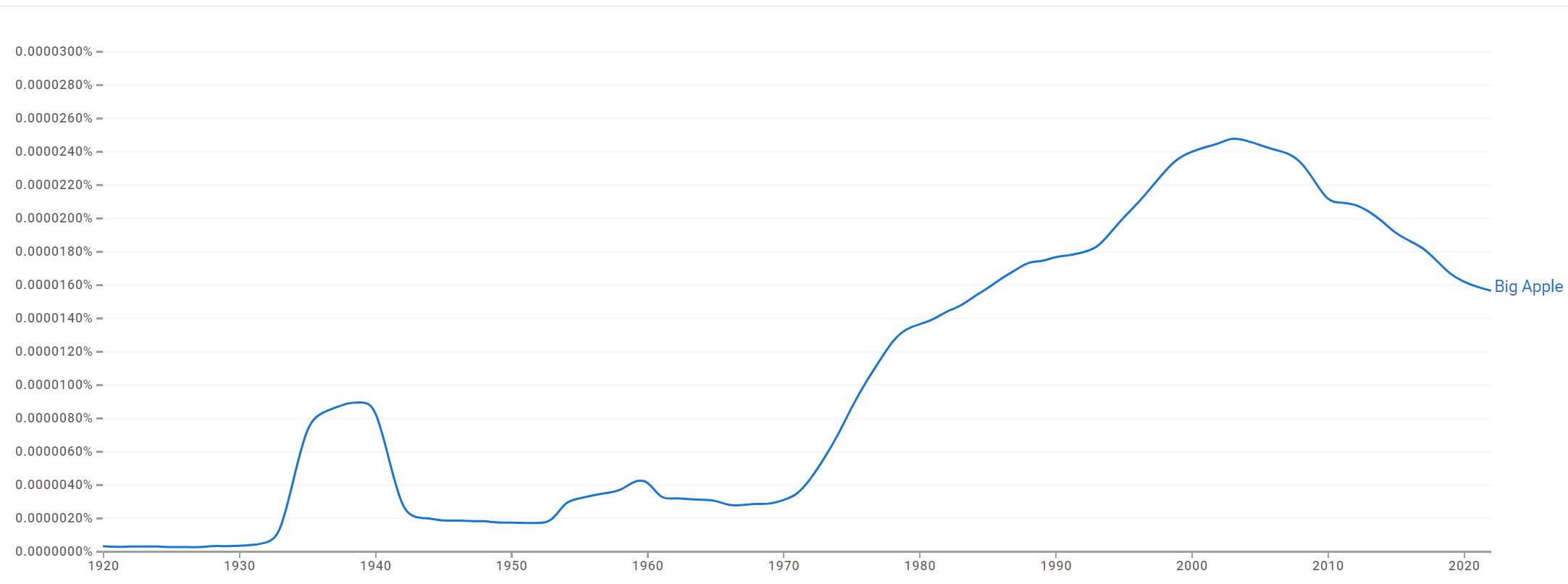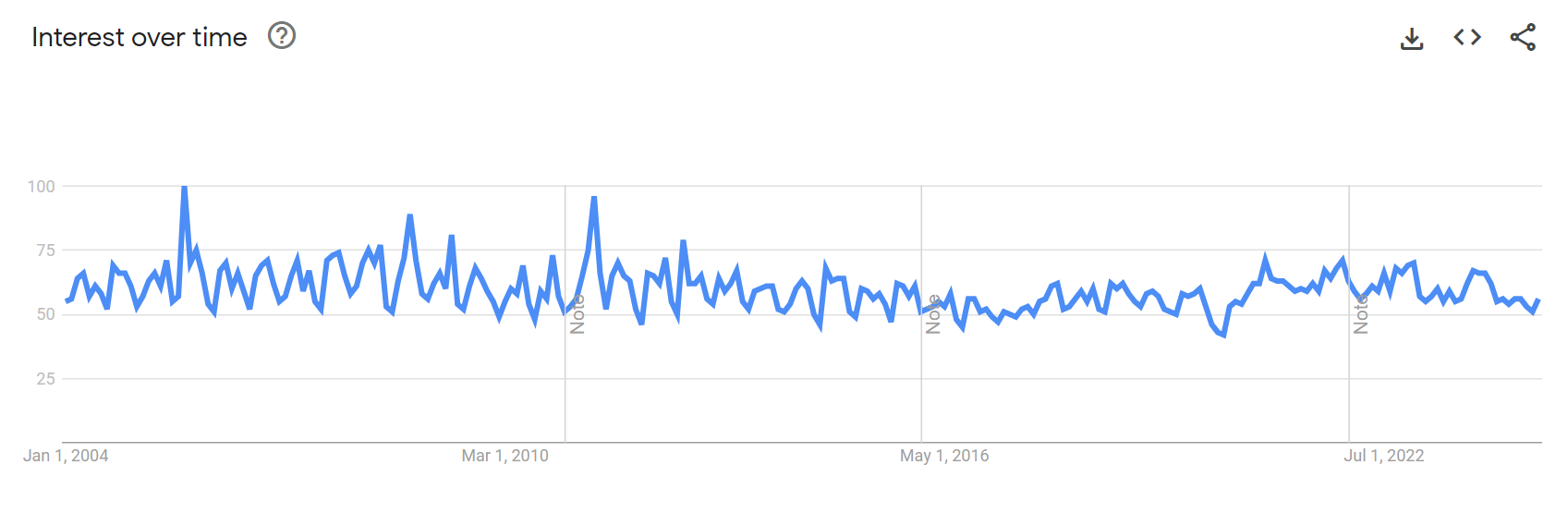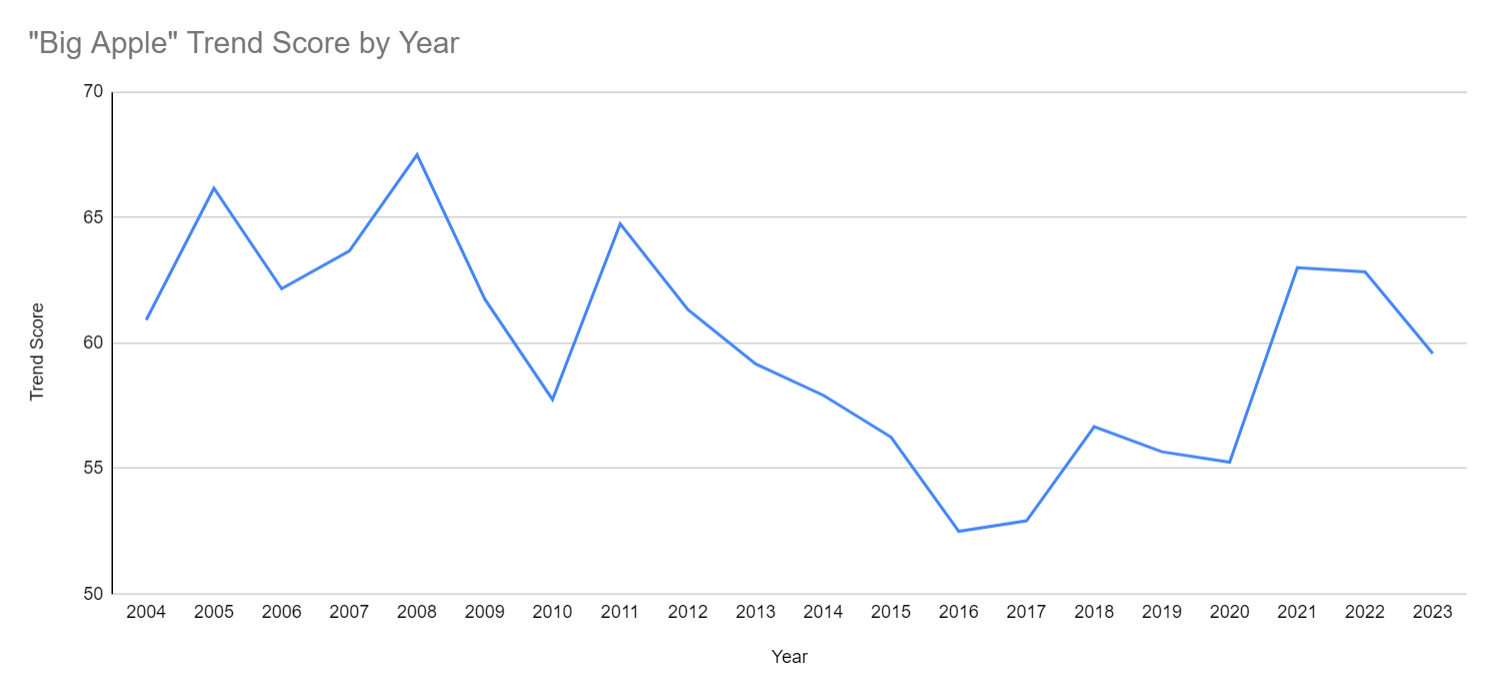Whatever Happened to "The Big Apple"?
October 23, 2024
I remember when I was a kid (early 2000s) I used to hear the term Big Apple quite a bit. At least, in a lot of the media I watched and even some of the games I played (like TMNT: Turtles in Time. "Big Apple, 3AM!") seemed to reference it pretty commonly. New York: The Big Apple. People saying "I want to take a bite out of the Big Apple!" and stupid shit like that. I kinda liked it, though. But lately, it feels like nobody's really calling New York the Big Apple anymore. I know people still mostly know what it means, but I haven't a person refer to NYC as the Big Apple since I was a kid.
Now that I'm actually living(ish) in NYC, I've pretty much never heard anyone say Big Apple. This is probably to be expected. It seems like more of a tourist thing to say, anyway, but I mean come on! It's the Big Apple, guys, I know it is. I guess there's some like random tourist shops that say Big Apple or have apple-y merchandise, but I'm talking about pop culture here, people, not tourist knick-knacks.
Are People Really Saying it Less?
Before I get too far into this random tirade, let's first figure out if people really are saying "Big Apple" less often. So, where can we get good quality data on this? Lucky for us, Google is a li'l stalker and has a few tools we can use for this.
The first tool is the Google NGram Viewer. It's a tool that lets you analyze commonality of words and phrases in digitized books (and possibly some other written media). It's super useful for investigating things like this, so let's give it a go.
As we can see from the graph, it looks like usage of "Big Apple" peaked around 2003 at 0.0000248469%. Today, however, it's hovering around 0.0000156347%. This is a drop of around 37%! It hasn't been this unpopular since the 80s, man.

Okay, so the NGram Viewer gives us data just on books. What if we want to analyze popular culture. Well, for that, the closest we can (probably) get is by using Google Trends, which analyzes search data to determine how "trendy" something is. It does this by generating some magical score which I'm sure represents something, but I haven't the slightest clue what. Anyway, let's take a look:

This graph is far less conclusive. Fortunately, Google lets us download the CSV for this data. I went ahead and calculated the average "trend scores" for each year since 2004 (as far back as it goes) and graphed the result:

Well, the results still really aren't that conclusive. It seems there's been a bit of a dip by about 10 points in the 2010s, but I'm no data scientist, I'm basically just looking at the values and saying "graph go down".
But what about in popular culture? Well, I'm actually not sure the best way to retrieve that info. What I'd like to do is graph Big Apple usage by year in movie and TV scripts, but I didn't find a tool that could do that. Maybe NGram takes scripts into account, maybe not. So, I'd have to do that manually and, frankly, I do not care enough to do that. Instead, let's take a look at some other dying terms (for fun, of course).
Other Dying Terms and Concepts
For simplicity (AKA, I'm lazy), I'll just be using just NGram.
Tahiti
This is another one that obsessed me. People used to be all about tahiti. It was in songs, movies. Everyone wanted to go there for some reason. For reference, Tahiti is the largest island in the French Polynesia island chain. Tahiti has really fallen off the popular culture. From its peak of 0.0000004414% in 1999, it has fallen all the way down to 0.0000001078% today. That's a decrease of around 76%!
Does the drop in NGram interest correlate to a drop in tourism? According to worlddata.info, it seems like the answer is maybe yes. We see a peak in 2000, then a dip until a smaller peak in 2007, but then a large dip in 2010 that crept up to an overall peak in 2019. So, kind of? But not really. Tourism is still booming there. Keep in mind this is for all of French Polynesia, not just Tahiti (couldn't find that data).
Computer Virus
Logically, it makes sense that people would be less interested in computer viruses. To the average person these days, viruses are hardly a concern, especially when compared to the early 2000s. Still, we've only seen a modest drop here. From 0.0000110035% in 2007 to 0.0000077794% today, a drop of around 29%.
Employee
Come to think of it, people don't really use this word much these days. What's up with that? It seems like people who work at companies nowadays are staff or they're workers or "members of the workforce". Maybe there's some sort of politeness thing or maybe "employee" feels too "cog-in-the-machine"-esque. This one's been on the downturn for quite a while. It peaked in 1986 at 0.0079501284%, but didn't drop significantly until the early 2000s (right after the time Office Space was released. Coincidence? I think not). Nowadays it's sitting at 0.0020632078% resulting in a drop of around 74%. Quite the fall.
Giga
People used to say Giga-something all the time. Like if someone wasn't just a nerd or super nerd, or even turbo nerd, they might be a giga nerd. Like, the ultimate form of nerdry. We used giga as the superest of superlatives. Nowadays, not so much. This peaked in 2000 at 0.0000072630% before falling to 0.000042963%, a hefty 41% drop in usage. Maybe we can call that a giga drop? (No. No we can't)
Honestly, it's not always intuitive how some words, phrases, or places have seemed to remove themselves from popular culture. While writing this, I came up with several words I thought for sure would be less common (mohawk, hooligan, slime, etc) that were actually more common know. I don't know what drives this dying out, but I do know I wish Big Apple would start its comeback, 'cause I kinda like it. And maybe I'll take a trip to Tahiti.